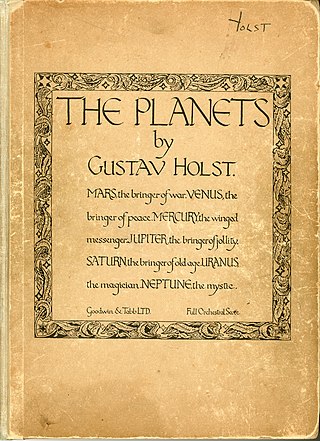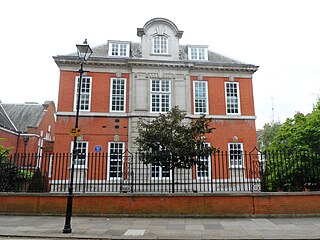Related Research Articles

Gustav Theodore Holst was an English composer, arranger and teacher. Best known for his orchestral suite The Planets, he composed many other works across a range of genres, although none achieved comparable success. His distinctive compositional style was the product of many influences, Richard Wagner and Richard Strauss being most crucial early in his development. The subsequent inspiration of the English folksong revival of the early 20th century, and the example of such rising modern composers as Maurice Ravel, led Holst to develop and refine an individual style.

The Planets, Op. 32, is a seven-movement orchestral suite by the English composer Gustav Holst, written between 1914 and 1917. In the last movement the orchestra is joined by a wordless female chorus. Each movement of the suite is named after a planet of the Solar System and its supposed astrological character.

A string orchestra is an orchestra consisting solely of a string section made up of the bowed strings used in Western Classical music. The instruments of such an orchestra are most often the following: the violin, which is divided into first and second violin players, the viola, the cello, and usually, but not always, the double bass.

Sir Granville Ransome Bantock was a British composer of classical music.

Imogen Clare Holst was a British composer, arranger, conductor, teacher, musicologist, and festival administrator. The only child of the composer Gustav Holst, she is particularly known for her educational work at Dartington Hall in the 1940s, and for her 20 years as joint artistic director of the Aldeburgh Festival. In addition to composing music, she wrote composer biographies, much educational material, and several books on the life and works of her father.
Gordon Percival Septimus Jacob CBE was an English composer and teacher. He was a professor at the Royal College of Music in London from 1924 until his retirement in 1966, and published four books and many articles about music. As a composer he was prolific: the list of his works totals more than 700, mostly compositions of his own, but a substantial minority of orchestrations and arrangements of other composers' works. Those whose music he orchestrated range from William Byrd to Edward Elgar to Noël Coward.
The First Suite in E♭ for Military Band, Op. 28, No. 1 is written by the English composer Gustav Holst. It is considered one of the cornerstone masterworks in the concert band repertoire. Officially premiered in 1920 at the Royal Military School of Music, the manuscript was originally completed in 1909. Along with the subsequent Second Suite in F for Military Band, written in 1911 and premiered in 1922, the First Suite convinced many other prominent composers that serious music could be written specifically for band.
The Second Suite in F for Military Band is Gustav Holst's second of his two suites for concert band. Although performed less frequently than the First Suite in E♭, it is still a staple of the band repertoire. The Second Suite, written in 1911 and first published in 1922, dedicated to James Causley Windram, is longer and considered more difficult to play than its sister suite.
Arthur Eckersley Butterworth, was an English composer, conductor, trumpeter and teacher.
Henry Ernest Geehl [pronounced 'Gale'] was an English pianist, conductor, composer and arranger.
The Severn Suite, Opus 87, is a musical work written by Sir Edward Elgar. It is a late composition, written in 1930, the result of an invitation to write a test piece for the National Brass Band Championship. It was dedicated to his friend, the author and critic George Bernard Shaw.
A Downland Suite is a 1932 composition for brass band in four movements by John Ireland. It has also been arranged for string orchestra and various other instruments.
Egdon Heath, Op. 47, H. 172, subtitled "A Homage to Thomas Hardy", is a tone poem by Gustav Holst, written in 1927. Holst considered it his most perfectly realised composition.
This is a summary of 1928 in music in the United Kingdom.
This is a summary of 1909 in music in the United Kingdom.
Kenneth Anthony Wright was a British composer and conductor.
Gustav Holst's suite The Planets has been the subject of frequent adaptations and additions, and many later works, particularly in popular music, have been derived from it. There are numerous references to the suite in popular culture.
Kenneth Harding was a violist in the BBC Symphony Orchestra for thirty-five years and a British composer, composing primarily for viola.

Hammersmith: Prelude and Scherzo, more commonly known as just Hammersmith, Op. 52, is a wind band work composed by English composer Gustav Holst in 1930, with a corresponding orchestral version. Commissioned by the BBC Military Band, the piece is based on Holst's love for the London borough of Hammersmith. The writing is more musically challenging than Holst's other wind band works, and is a wind band essential today. A typical performance runs for 14 minutes.
References
- 1 2 3 Allen, Stephen Arthur (Winter 2017). "Symphony Within: Rehearing Holst's A Moorside Suite". Musical Times. 158 (1941).
- ↑ "A Moorside Suite, H.173 (Holst, Gustav)". IMSLP Petrucci Music Library. Project Petrucci LLC. Retrieved 31 July 2019.
- ↑ Short, Michael (1990). Gustav Holst: The Man and his Music. Oxford: Oxford University Press. p. 263. ISBN 0-19-314154-X.
- ↑ "1928 National Brass Band Championships of Great Britain final". Brass Band Results. 28 October 2018.
- ↑ Taylor, Kenric (28 October 2018). "A Moorside Suite". Gustav Holst.info. Archived from the original on 11 February 2019. Retrieved 28 October 2018.
- ↑ "National Championship of Great Britain (Championship Section Final)". Brass Band Results. 28 October 2018.